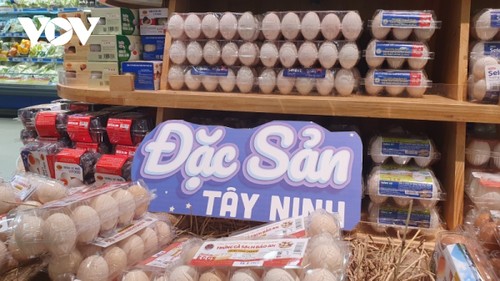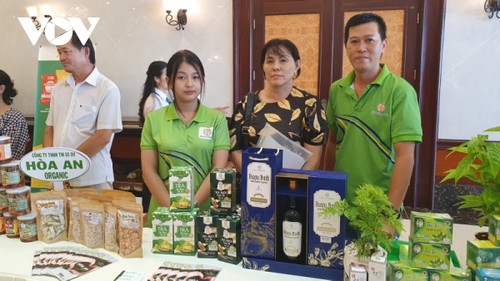 Tay Ninh’s specialties are available in domestic supermarkets. Tay Ninh’s specialties are available in domestic supermarkets. |
Long An province has more than 11,000 hectares of lemons, mainly in Ben Luc, Duc Hoa, Thu Thua, and Thanh Hoa district. Long An’s fresh lemon and products processed from lemon, account for more than 85% of Vietnam’s output.
Although OCOP lemon products are increasingly diverse, it remains a long story to bring the products to the domestic retail system.
According to Nguyen Van Hien, Chairman of the Chanh Viet Long An Company (CHAVI), businesses, cooperatives and retail supermarket systems have worked closely but it’s not easy to convince consumers to accept lemon products.
Supermarkets only prioritize the products that are much sought after in the market due to high costs for shop space and hiring staff, said Hien.
“So if our products are not suitable, they will be removed from the shelf. If you want to attract buyers, it’s necessary to increase advertisement and promotional programs. It always takes much time for new products and local specialties to gain a position in supermarkets,” Hien concluded.
Compared to other provinces and cities nationwide, Tay Ninh province doesn’t have many 4-to-5-star OCOP products. Among the 68 recognized OCOP products, there is one 5-star product and twenty 4-star items.
Truong Thi Thi, Chief Manager of Hoa An Trading, Producing and Service Company, said that in addition to local specialties including bamboo-root fish sauce, Ba Den custard apple, and rice paper, Tay Ninh also has an advantage in producing tea, wine and beverages from custard apple and pomelo fruits.
Although the products are rated to OCOP standards, they haven’t yet been available in supermarket chains.
“Our local products haven’t been able to access the Co.op Mart supermarket system. We hope that the provincial administration will organize more connection and promotion programs so that businesses can access the retail systems and, at the same time, make timely adjustments to enable local OCOP products to reach more customers,” said Thi.
Chau Thi Le, Deputy Director of Long An province’s Department of Industry and Trade, said that the locality is trying to link local OCOP products with supermarkets owned by Saigon Corp, MM Mega Market, Aeon Mall, and Go!
She added that the local OCOP products have initially entered several supermarket systems of overseas Vietnamese in the US, Canada, and Japan.
Le added several businesses have adjusted their products to meet market requirements by sending samples and improving quality standards and product designs.
“There are small businesses specializing in making OCOP products that are willing to accompany the province’s trade promotion program. And to date, some of them have exported 3 shipments,” said Le.
 Businesses in Tay Ninh province actively participate in programs to connect and promote the consumption of OCOP items. Businesses in Tay Ninh province actively participate in programs to connect and promote the consumption of OCOP items.
|
Le Anh Tuan, Director of the Tay Ninh provincial Department of Industry and Trade, said Tay Ninh is helping manufacturers standardize products in addition to promoting the connection of goods consumption to large distribution systems, especially in the Co.op Mart chain of Saigon Corp.
According to Tuan, that way will help producers gradually meet the requirements of the commercial system, especially with modern supermarkets like Saigon Corp while the supermarket systems will have a stable source of goods, from which both sides will develop together.
“Provincial departments and sectors will advise the provincial People’s Committees which, through the National Assembly, will propose the central government to promulgate proper policies to help agriculture and local production develop,” said Tuan.
OCOP products of the Southeastern provinces are gradually winning the favor of consumers thanks to the building of the connection between production and retail chains through events, trade fairs, seminars for trade networking, and showrooms.